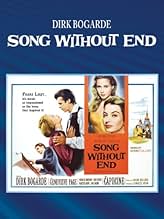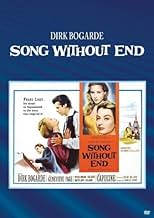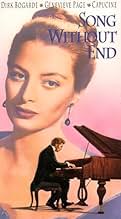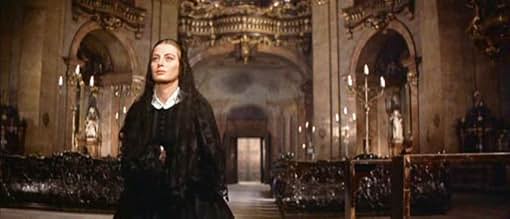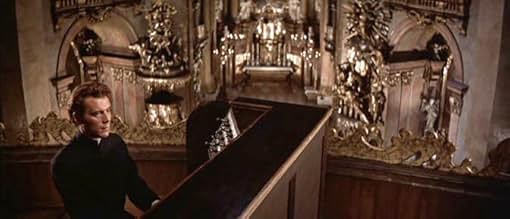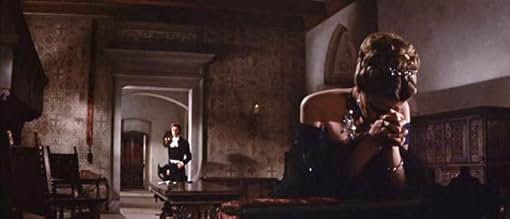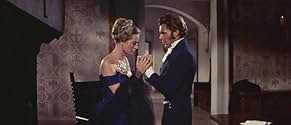The romantic story of Hungarian pianist Franz Liszt (Sir Dirk Bogarde), whose scandalous love affair forced him to abandon his adoring audiences.The romantic story of Hungarian pianist Franz Liszt (Sir Dirk Bogarde), whose scandalous love affair forced him to abandon his adoring audiences.The romantic story of Hungarian pianist Franz Liszt (Sir Dirk Bogarde), whose scandalous love affair forced him to abandon his adoring audiences.
- Won 1 Oscar
- 2 wins & 3 nominations total
- Thalberg
- (as E. Erlandsen)
- Chopin
- (as Alex Davion)
- Emissary
- (scenes deleted)
- Audience Member
- (uncredited)
- Komparsenrolle
- (uncredited)
- Directors
- Writers
- All cast & crew
- Production, box office & more at IMDbPro
Storyline
Did you know
- TriviaCharles Vidor had completed about 15 percent of this movie when he died of a heart attack on June 4, 1959. Sir Dirk Bogarde later recalled that he was "secretly relieved" by Vidor's death, since he and his co-star, Capucine had been treated badly by the short-tempered director. Vidor would often scream at Capucine to relax, and at one point, Bogarde recalled, "shook her like a dead cat." Vidor was replaced by George Cukor, who got along much better with his stars, and was more of an "actor's director."
- GoofsGrand Duchess make reference to "Ukraine" in one scene. The term was not in wide use in the 1840s, especially not among Russian nobility.
- Quotes
Countess Marie: I met Franz at a musical party. I remember he played a ballade in A-flat major by Chopin. I thought I'd never seen anything as beautiful as Franz looked when he sat at the piano. I... I wanted to cry. He watched me as he played; Franz never fails to notice a pretty woman in his audience. Afterward, he followed me into the hall. I remember he said, "May I escort you somewhere, madame?" And I said, "Yes." And he said, "Where?" And I said, "Paradise." He didn't smile - he said, "I'll call a carriage."
Princess Carolyne: Did he?
Countess Marie: What?
Princess Carolyne: Drive you there - to paradise?
Countess Marie: [a pause, and a meaningful look as she turns to leave the room] He doesn't know the road, madame.
- ConnectionsFeatured in Film Profile: Dirk Bogarde (1961)
The film only covers part of Liszt's life and concentrates (naturally) on the turmoil in his love affairs, which leads to his attempt to marry the already married Princess Carolyne Wittgenstein; he left his married girlfriend, Countess Marie D'Agoult, the mother of his children for her. (One of his daughters, Cosima, married Richard Wagner, who features in this film.) I disagree with a previous comment complaining about the way Liszt is portrayed. While it's not emphasized, it is obvious that he was a man of great charity, donating many of his fees to various organizations, and playing many benefit concerts. Later on, he concentrated on composing, at which he was very successful. As a performer, Liszt was a bona fide rock star in his day, complete with hysterical fans. He was most certainly attractive to women and religiously conflicted.
Dirk Bogarde does a sensational job as Liszt. This and "The Angel Wore Red" were his only Hollywood films. Even if they had been successful, it's doubtful Bogarde would have stayed in the states, as he probably wouldn't have been cast in the kinds of films he wanted to make and/or the kinds of parts he wanted to play. He makes a very romantic, intense Liszt, and his fingerings are nothing short of amazing. Capucine is good, if a little wooden, as Carolyne. The supporting cast is very good.
The production and costumes are opulent, but they are dwarfed by the music. Definitely some of the most brilliantly performed classical music in film.
Highly recommended for classical music lovers.
- How long is Song Without End?Powered by Alexa
Details
- Release date
- Country of origin
- Language
- Also known as
- Song Without End - The Story of Franz Liszt
- Filming locations
- Production company
- See more company credits at IMDbPro
- Runtime2 hours 21 minutes
- Aspect ratio
- 2.35 : 1
Contribute to this page



